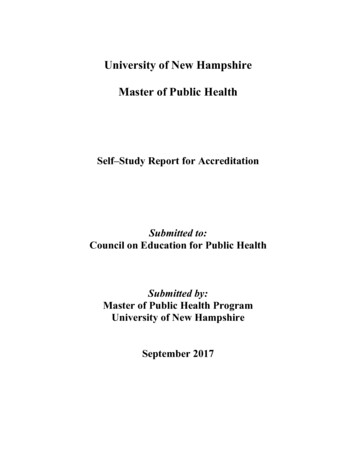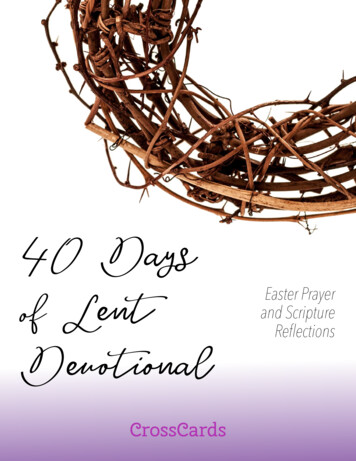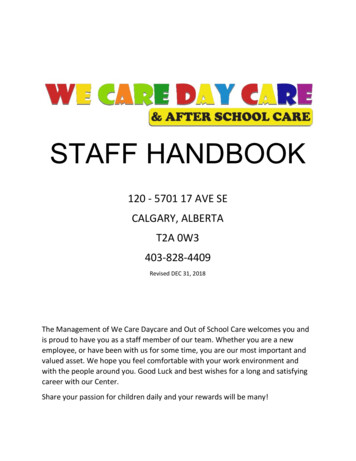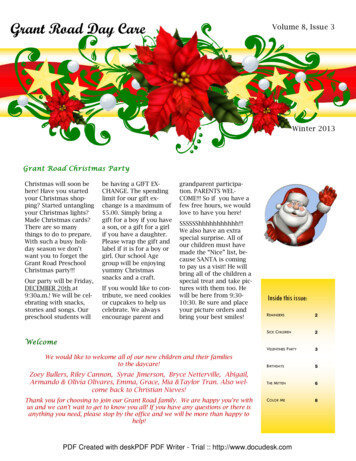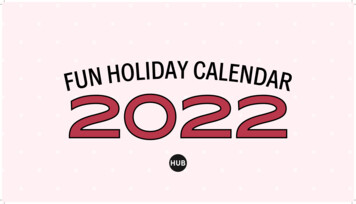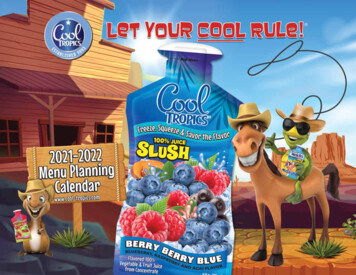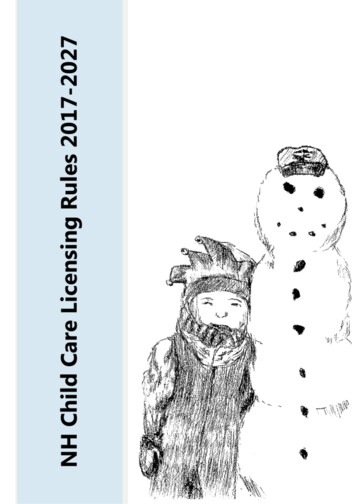
Transcription
NEW HAMPSHIREDEPARTMENT OF HEALTH AND HUMAN SERVICESUsing the RulebookThere are many sections of the rulebook, some you’ll use on a daily basis, and others youwill reference only occasionally. The best way to start is to review the rulebook in its entirety toget a sense of what is here. Then carefully read the sections that affect your daily work.Reference the book when you are starting a new or unfamiliar process, such as your licenserenewal application or making changes to your program. All staff members should haveknowledge of and access to the rules, so please share them. We are here to help, so if you everhave a question just ask us.The rulebook can be a great resource and training tool. As we move forward with ourplans, we will be providing interpretive guide pages to ensure a common understanding of therules. The rule can be printed out and placed in a binder, and as the interpretive guides arereleased, they too can be added to the appropriate sections. When using the PDF version, you canquickly search for certain words within the rule to find the information you need, as well asselecting what section you want in the Table of Contents and immediately be brought to it.This is a book for providers; so if you need something, let us know. We also ask that yougo to our website regularly for updates, tools and other information.Bureau of Licensing and CertificationChild Care Licensing Unit129 Pleasant StreetConcord, New Hampshire 03301-38571-800-852-3345, ext. 9025 or (603) 271-9025Website: https://www.dhhs.nh.gov/oos/cclu/index.htmcover illustration by Colin Nelson-Peck
NH HAMPSHIRE CODE OF ADMINISTRATIVE RULESTable of ContentsHe-C 4002.01 Definitions . 1He-C 4002.02 Application. . 8He-C 4002.03 Waivers of Rules. . 10He-C 4002.04 License and Permit Requirements. . 12He-C 4002.05 Renewal of License. . 18He-C 4002.06 Critical Rules, Statements of Findings, and Corrective Action Plans. . 19He-C 4002.07 Complaints and Investigations. . 23He-C 4002.08 Confidentiality. . 25He-C 4002.09 Enforcement Action. . 27He-C 4002.10 Administrative Fines. . 33He-C 4002.11 Informal Dispute Resolution. . 37He-C 4002.12 Time Frames for Departmental Response to Applications. . 38He-C 4002.13 License Capacity and Staff and Child Attendance. . 39He-C 4002.14 Health and Safety in the Child Care Environment. . 41Table 4.2.2 Energy Absorptive Surface47He-C 4002.15 Water Supply, Septic Systems, Bathroom Facilities and Diaper Changing Facilities. 49He-C 4002.16 Child Care Personnel and Household Members Health Requirements. . 53He-C 4002.17 Child Health Requirements and Communicable Disease Issues. . 54He-C 4002.18 Administration and Storage of Medication. . 56He-C 4002.19 Prevention and Management of Injuries and Emergencies. . 59He-C 4002.20 Child Registration and Emergency Information. . 67NOTE TO PARENT/S or GUARDIAN/S67He-C 4002.21 Child Care Space. . 69He-C 4002.22 Learning Materials, Toys and Equipment. . 72He-C 4002.23 Rest and Sleep. . 75He-C 4002.24 Program Requirements. . 77He-C 4002.25 Behavior Guidance and Treatment of Children. . 80He-C 4002.26 Hand Washing. . 83He-C 4002.27 Nutrition, Food Service and Food Safety. 84
NH HAMPSHIRE CODE OF ADMINISTRATIVE RULESHe-C 4002.28 Diaper Changing and Toileting. . 89He-C 4002.29 Field Trips, Water Activities and Transportation. . 90He-C 4002.30 Professional Development. . 95He-C 4002.31 Family Based Programs. . 99He-C 4002.32 Requirements for Child Care Personnel in Center Based Programs. . 101Substitute staff102Center director103Lead teacher104Associate teacher104Assistant teachers105Junior helper105Site director106Group leader106Assistant group leader107He-C 4002.33 Group Child Care Center. . 108He-C 4002.34 Infant and Toddler Program.109He-C 4002.35 Preschool Program. . 110He-C 4002.36 School-Age Program. . 111He-C 4002.37 Night Care Program. . 113APPENDIX A . iAPPENDIX B . iiiAPPENDIX C . ivIndex .xiii
NH HAMPSHIRE CODE OF ADMINISTRATIVE RULESHe-C 4002.01 DefinitionsPART He-C 4002 NH CHILD CARE PROGRAM LICENSING RULESHe-C 4002.01 Definitions(a) “Administer” means an act whereby a single dose of a medication is instilled into the body of,applied to the body of, or otherwise given to a child for immediate consumption or use.(b) “Agency” means “child day care agency” as defined in RSA 170-E:2, IV. The term alsoincludes “child care program” or “program.”(c) “Applicant” means “applicant” as defined in RSA 170-E:2, I.(d) “Assistant group leader” means a person who is employed in or is seeking employment in aNew Hampshire licensed child care program, who meets the age, education and experience requirementsspecified in He-C 4002.32(t).(e) “Assistant teacher” means a person who is employed in or is seeking employment in a NewHampshire licensed child care program, who meets the age, education, and experience requirementsspecified in He-C 4002.32(o).(f) “Associate teacher” means a person who is employed in or is seeking employment in a NewHampshire licensed child care program, who meets the age, education, and experience requirementsspecified in He-C 4002.32(n) for employment in center based programs.(g) “Authorized staff” means child care personnel that have completed training in medicationsafety and administration who are responsible for administration of medications to children.(h) “Bureau” means the department’s bureau of licensing and certification.(i) “Center based program” means any program owned and operated by one applicant which is notlicensed as a family or family group child care home and is licensed to provide any of the following typesof child care:(1) Group child care center;(2) Infant and toddler program;(3) Night care program;(4) Preschool program;(5) School-age program; or(6) Any combination thereof.(j) “Child” means “child” as defined in RSA 170-E:2, II, namely “any person under 18 years ofage.”(k) “Child care” means “child day care” as defined in RSA 170-E:2, III, namely “the care andsupervision of a child away from the child’s home and apart from the child’s parents.”(l) “Child care program personnel” means the center director, site director, family child careprovider, and any individual:1
NH HAMPSHIRE CODE OF ADMINISTRATIVE RULESHe-C 4002.01 Definitions(1) Who is employed by a child care program for compensation, including office, kitchen andjanitorial staff, contract employees or self-employed individuals; or(2) Whose activities involve the care or supervision of children for a child care program orunsupervised access to children who are enrolled in a child care program.(m) “Clean” means to remove dirt, debris, and bodily fluids by scrubbing and washing with adetergent solution and rinsing with water.(n) “Commissioner” means “commissioner” as defined in RSA 170-E:2, V, namely “thecommissioner of the department of health and human services.”(o) “Corporal punishment” means physical actions against a child, including but not limited to:(1) Slapping;(2) Striking;(3) Shaking;(4) Shoving;(5) Spanking;(6) Pinching;(7) Twisting;(8) Kicking;(9) Biting;(10) Ear pulling or ear twisting;(11) Hair pulling;(12) Spraying with water as a means of controlling behavior;(13) Placing tape over a child’s mouth;(14) Mechanical restraints, such as tying a child to a chair;(15) Rough handling;(16) Other forms of aggressive contact; or(17) Requiring or forcing a child to take an uncomfortable position such as:a. Squatting;b. Kneeling;c. Standing, holding arms outstretched at sides or overhead;d. Bending; or2
NH HAMPSHIRE CODE OF ADMINISTRATIVE RULESHe-C 4002.01 Definitionse. Requiring or forcing a child to repeat physical movements.(p) “Corrective action plan” means “corrective action plan” as defined in RSA 170-E:2, VI,namely “a written proposal setting forth the procedures by which a child day care agency will come intocompliance with the standards set by rules adopted by the commissioner under RSA 541-A, and subject tothe approval of the department. The proposal shall include the time needed to assure compliance and thesteps proposed by the agency to reach compliance.”(q) “Critical rules” means the rules listed in He-C 4002.06, which the department has determinedare most critical because non-compliance with those rules has the highest likelihood to jeopardize thehealth, safety or well-being of the children in care, or the operations of the child care program.(r) “Department” means “department” as defined in RSA 170-E: 2, VII, namely “the departmentof health and human services.”(s) “Developmentally appropriate” means actions, interview, equipment, supplies,communications, interactions, or activities that are based on the developmental level and abilities, thefamily culture, and the individual needs of each child in care.(t) “Family child care home” means “family day care home” as defined in RSA 170-E:2, IV(a),namely “an occupied residence in which child day care is provided for less than 24 hours per day, exceptin emergencies, for up to 6 children from one or more unrelated families. The 6 children shall includeany foster children residing in the home and all children related to the caregiver except children who are10 years of age or older. In addition to the 6 children, up to 3 children attending a full day schoolprogram may also be cared for up to 5 hours per day on school days and all day during school holidays.”(u) “Family child care assistant” means a person who is employed in or is seeking employment ina New Hampshire licensed child care program, who meets the age, education, and experiencerequirements specified in He-C 4002.31(d).(v) “Family child care provider” means the individual in whose home family or family group childcare services are provided, who is responsible for the operation of the program, and who provides thechild care for at least ⅔ of the operating hours.(w) “Family child care worker” means a person who is employed in or is seeking employment in aNew Hampshire licensed child care program, who meets the age, education, and experience requirementsspecified in He-C 4002.31(c).(x) “Family group child care home” means “family group day care home” as defined in RSA 170E:2, IV(b), namely “an occupied residence in which child day care is provided for less than 24 hours perday, except in emergencies, for 7 to 12 children from one or more unrelated families. The 12 childrenshall include all children related to the caregiver and any foster children residing in the home, exceptchildren who are 10 years of age or older. In addition to the 12 children, up to 5 children attending a fullday school program may also be cared for up to 5 hours per day on school days and all day during schoolholidays.”(y) “Full day school program” means a kindergarten or elementary school program which operatesmore than 5 hours each day, and is administered by a public or private school which is approved by thedepartment of education.(z) “Group child care center” means “group child day care center” as defined in RSA 170-E:2,IV(c), namely “a child day care agency in which child day care is provided for preschool children and up3
NH HAMPSHIRE CODE OF ADMINISTRATIVE RULESHe-C 4002.01 Definitionsto 5 school-age children, whether or not the service is known as day nursery, nursery school,kindergarten, cooperative, child development center, day care center, center for the developmentallydisabled, progressive school, Montessori school, or by any other name.”(aa) “Group leader” means a person who is employed in or is seeking employment in a NewHampshire licensed child care program, who meets the age, education, and experience requirementsspecified in He-C 4002.32(s).(ab) “Guardian” means “guardian” as defined in RSA 170-E:2, VIII, namely “the guardian of theperson of a minor, as defined in RSA 463.”(ac) “Household member” means any person residing in the home of an applicant for licensure asa program, if the program will be located in that home.(ad) “Incident Command System” (ICS), means a standardized on-scene emergency managementsystem specifically designed to provide for the adoption of an integrated organizational structure thatreflects the complexity and demands of single or multiple incidents, without being hindered byjurisdictional boundaries. ICS is the combination of facilities, equipment, personnel, procedures, andcommunications operating within a common organizational structure, designed to aid in the managementof resources during incidents, in coordination with local emergency response agencies in the communityin which the program is located.(ae) “Infant” means a child from the time of birth to 18 months old, except as referenced in He-C4002.34.(af) “Infant and toddler program” means “day care nursery” as defined in RSA 170-E:2, IV(d),namely “a child day care agency in which child day care is provided for any part of a day, for 5 or morechildren under the age of 3 years.”(ag) “In-service professional development” means professional development activities includingtraining or education acquired after an individual meets the qualifications for his or her position andwhich is acceptable toward meeting the annual professional development requirements for child carepersonnel, as specified in He-C 4002.30.(ah) “Junior helper” means a person who is engaged in a New Hampshire licensed child careprogram, who meets the age, education, and experience requirements specified in He-C 4002.31(h) or HeC 4002.32(q).(ai) “Lead teacher” means a person who is employed in or is seeking employment in a NewHampshire licensed child care program, who meets the age, education, and experience requirementsspecified in He-C 4002.32(m).(aj) “License” means “license” as defined in RSA 170-E:2, IX, namely “an authorization grantedby the commissioner to provide one or more types of child day care.”(ak) “License capacity” means the number and ages of children specified on the license or permitallowed to be on the premises at any one time.(al) “Licensed health care practitioner” means a physician, physician's assistant, advancedregistered nurse practitioner, dentist, or other licensed professional with prescriptive authority.4
NH HAMPSHIRE CODE OF ADMINISTRATIVE RULESHe-C 4002.01 Definitions(am) “Licensing coordinator” means a person employed by the department who consults with andinspects programs for compliance with RSA 170-E and He-C 4002.(an) “Medication” means a drug prescribed for a child by a licensed health care practitioner andnon-prescription medications.(ao) “Medication error” means any error in the prescribed or documented administration of amedication.(ap) “Medication order” means:(1) The prescription label attached to the prescription container;(2) Written directions accompanying the medication or provided by a licensed health carepractitioner for a specific prescription or non-prescription medication to be administered to achild;(3) Written directions provided by the child’s parents for non-prescription medication to beadministered to a child when no manufacturer’s instructions are available for a specificchild’s age, including a statement that the dosage instructions have been reviewed with thechild’s licensed health care practitioner; or(4) Written permission provided by the child’s parents for topical substances to beadministered to a child.(aq) “Monitoring visit” means “monitoring visit” as defined in RSA 170-E:2, X, namely “a visitmade to the child day care agency by department personnel for the purpose of assessing compliance withthe standards set by rule adopted by the commissioner pursuant to RSA 541-A.”(ar) “Night care program” means “night care agency” as defined in RSA 170-E:2, IV(e).(as) “Parent” means a father, mother, guardian, person, agency, or program legally authorized toact on behalf of a child.(at) “Permit” means “permit” as defined in RSA 170-E:2, XI, namely “the initial authorization tooperate issued to an operator of a child day care agency, which shall not be renewable except for goodcause shown.”(au) “Pesticide” means a fungicide, insecticide, herbicide, or rodenticide, but does not meansanitizer, disinfectant, microbial agent, or rodent or insect bait in a tamper resistant container.(av) “Preschool program” means “preschool program” as defined in RSA 170-E:2, IV(f), namely“a child day care agency providing care and a structured program for children 3 years of age and olderwho are not attending a full day school program. The total number of hours a child may be enrolled in apreschool program shall not exceed 5 hours per day.”(aw) “Pre-service training” means training or education required before an individual can serve ina specific position in accordance with He-C 4002.31 for family based programs and He-C 4002.32 forcenter based programs.(ax) “Program” means any or all of the various types of child care agencies providing care on oroff the approved licensed premises listed below:5
NH HAMPSHIRE CODE OF ADMINISTRATIVE RULESHe-C 4002.01 Definitions(1) Center based;(2) Infant and toddler;(3) Family child care home;(4) Family group child care home;(5) Group child care center;(6) Night care;(7) Preschool; and(8) School age.(ay) “Project leader” means a person who is engaged in a New Hampshire licensed child careprogram, who meets the age, education, and experience requirements specified in He-C 4002.32(u).(az) “Qualified substitute” means a person who assumes the responsibilities of a center director orsite director and who meets the age, education, and experience requirements of the position for whichthey are substituting.(ba) “Regionally accredited college or university” means a college or university acknowledged asmeeting acceptable levels of quality through accreditation by any of the regionally accreditingorganizations recognized by the US department of education or the council for higher educationaccreditation.(bb) “Regularly” means “regularly” as defined in RSA 170-E:2, XII, namely “supervision andcare up to and including 7 days a week, whether paid or unpaid, for the following as defined in RSA 170E:2, IV: (a) family day care home, (b) family group day care home, (c) group child day care center, (d)day care nursery, (e) night care agency, (f) preschool program, and (g) school-age program.”(bc) “Repeat violation” means a violation of a specific licensing rule or law for which the programhas been previously cited during the past 5 years, for violations before January 1, 2019, or during the past3 years for violations on or after January 1, 2019, and which has not been removed as a result of aninformal dispute resolution or overturned as a result of an adjudicatory procedure. A repeat violation doesnot need to include the same set of circumstances, or involve the same child care program personnel orthe same child or children as in the original citation.(bd) “Sanitize” means to clean to remove all organic material then wipe down or wash with asolution of chlorine bleach and room temperature or cool water which is mixed fresh daily permanufacturer’s directions for sanitation and left on the surface for 2 minutes or with an environmentalprotection agency (EPA) approved germicide designed to kill germs and which, when used in accordancewith manufacturer’s directions, does not pose a health or safety risk to children.(be) “School-age program” means “school-age program” as defined in RSA 170-E:2, IV(g),namely “a child day care agency providing child day care for up to 5 hours per school day, before or after,or before and after, regular school hours, and all day during school holidays and vacations, and which isnot licensed under RSA 149, for 6 or more children who are 4 years and 8 months of age or older. Thenumber of children shall include all children present during the period of the program, including thosechildren related to the caregiver.”6
NH HAMPSHIRE CODE OF ADMINISTRATIVE RULESHe-C 4002.01 Definitions(bf) “Serious safety risk” means behavior of such intensity, frequency, or duration that the safetyof the child or others is placed in serious jeopardy.(bg) “Site coordinator” means a person who is qualified as a site director and is employed tooversee multiple school age program licenses by a single applicant, licensee, or permittee.(bh) “Site director” means a person who is employed in or is seeking employment in a NewHampshire licensed child care program, who meets the age, education, and experience requirementsspecified in He-C 4002.32(r).(bi) “Statement of findings” means a written report issued by the department which details thefindings of a visit or an investigation conducted by the department.(bj) “Substitute” means a person who assumes the responsibility of any child care programpersonnel on a temporary basis, who meets the age and education or experience requirements of theposition for which they are substituting.(bk) “Supervision” means knowing the number and identity of children in care, being accountablefor the activity and whereabouts of each child in care, and having the ability to see or hear all children atall times and to provide prompt intervention to safeguard each child from accident or injury.(bl) “Toddler” means a child 19 months to 35 months old, except as referenced in He-C 4002.34.(bm) “Toileting” means to use the toilet or to assist a child in using the toilet.(bn) “Topical substances” include, but are not limited to, non-prescription medications such assunscreen, insect repellent, medicated powders, teething medication, and diaper ointments.(bo) “Unit” means the child care licensing unit with the department.(bp) “Wading pool” means a container of water designed for young children to wade and play in,which is portable and contains water that is less than 10 inches deep.(bq) “Water activity” means any activity during which children are exposed to swimming pools,water features, or other bodies of water, excluding water tables, wading pools, or sprinklers, whether thechildren will be swimming, wading, playing or walking in the water, floating, or boating on, or otherwisein, on or near a pool or body of water.(br) “Water feature” means a natural or manmade structure or apparatus including but not limitedto a pond, fountain, or stream that includes moving water or water that is more than one inch deep,excluding water tables, wading pools, or sprinklers.7
NH HAMPSHIRE CODE OF ADMINISTRATIVE RULESHe-C 4002.02 Application.He-C 4002.02 Application.(a) Any person or entity who intends to operate a program shall obtain an application packet fromthe bureau of licensing and certification, child care licensing unit.(b) All applicants for licensure shall complete and submit an application “Application for FamilyChild Care Program” or "Application for Child Care Center" (11/6/2017) to the department which shallnot be considered complete until all of the information requested on the application form and theattachments specified in this section have been received, including any signatures required on such forms.(c) Center based programs which have multiple buildings on the same or contiguous propertiesmay apply for a single license for those buildings, provided that:(1) The buildings function as a single program;(2) The buildings are in close proximity to ensure that no street, road, or obstacle is presentwhich would impede the safe flow of individuals between the buildings;(3) There is a means of communication between the buildings which allows the multiplebuildings to function efficiently as a single program;(4) Staffing requirements for center based agencies with multiple buildings are met asspecified in He-C 4002.32; and(5) In each building, there are adequate square footage and bathroom facilities for thenumber of children who will be cared for, in accordance with He-C 4002.15(c) through (l)and He-C 4002.21(a) through (j).(d) Except as specified in (j) below, the applicant shall submit to the department the followingattachments with the application:(1) A “Child Care Personnel Health Form” (5/2017) provided by the department or anequivalent record of a health screening documenting that the family child care provider, thecenter director, or site director has had a physical examination and is able to work withchildren completed no more than one year prior to the date the department receives theapplication;(2) A completed health officer inspection form documenting that, within the 12 monthsimmediately preceding the date the department receives the application, the premises havebeen inspected and approved by a local health officer, for operation as a program;(3) A New Hampshire fire code compliance report documenting that, within the 12 monthsimmediately preceding the date the application for licensure is received by the department,the premises have been inspected for compliance with Saf-C 6000, state fire code by the localfire department or the state fire marshal’s office, and approved to operate as a program;(4) Documentation from the applicable town or city that the program has been grantedzoning approval or that no zoning approval is required;(5) A completed and notarized “Household and Personnel Form” (11/1/2017) for each of thefollowing:8
NH HAMPSHIRE CODE OF ADMINISTRATIVE RULESHe-C 4002.02 Application.a. The owner or applicant;b. All household members age 10 years and older;c. All child care program personnel age 14 and older; andd. All other individuals age 10 and older, who are not enrolled in the child care programwho will have unsupervised contact with the children; and(6) A copy of any documents required to be filed with the secretary of state regarding tradenames, limited liability corporations, or corporations, as applicable.(e) Each individual age 18 and older listed on the “Household and Personnel Form” (11/1/2017) inaccordance with (d)(5) above shall also submit a criminal history record information authorization formand a complete set of fingerprints to the department of safety, in accordance with RSA 170-E: 7, I-a,except:(1) When an individual has a non-expired child care employment eligibility card, issued bythe department in accordance with RSA 170-E: 7, IV-a; and(2) The individual has been employed in a NH licensed child care program within theprevious 6 months.(f) For any family or family group child care provider between 18 and 21 years of age, the agencyshall submit documentation that the individual meets the education requirements specified in He-C4002.31.(g) For all center based programs, the agency shall submit documentation that the center director,site coordinator or site director meets the education and expe
Hampshire licensed child care program, who meets the age, education, and experience requirements specified in He -C 4002.32(o). f)( "Associate teacher" means a person who is employed in or is seeking employment in a New Hampshire licensed child care program, who meets the age, education, and experience requirements

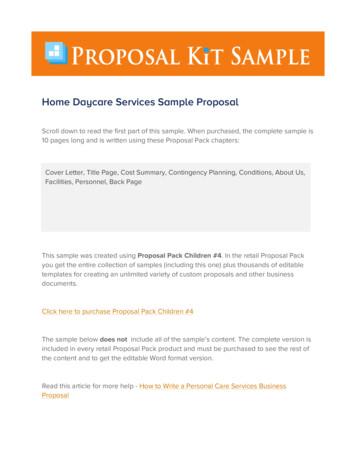
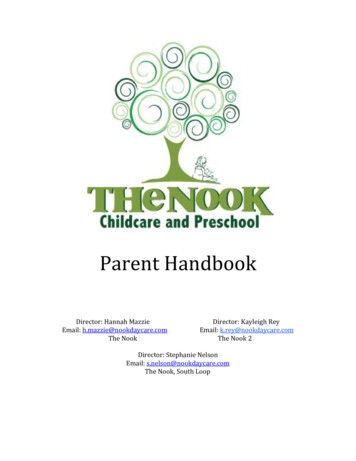
![Welcome [dashdiet.me]](/img/17/30-day-weight-loss-journal.jpg)
